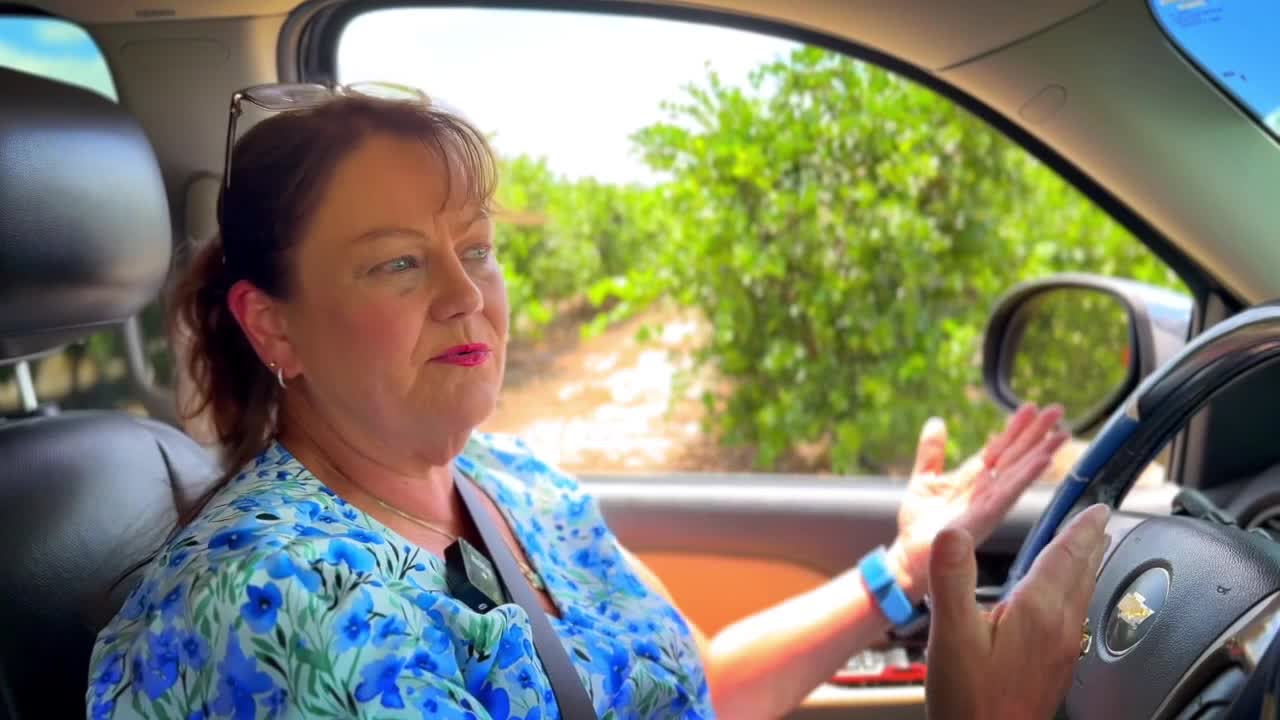LAKE PLACID, Fla. — In the heart of Florida, orange groves once told stories of abundance and prosperity. Today, they tell a story of struggle and survival.
WATCH: 'It’s tough': FDA considers lowering orange juice sweetness as Florida growers struggle
Pam Fentress knows that firsthand. She grew up working in her family’s grove in Lake Placid, which her grandfather had started in 1964. At its peak, Lost Lake Groves spanned 1,500 acres. Now, it is down to just 12 acres of high-density orange trees she is still trying to nurture, even as the land goes up for sale.
“That’s a tough bullet to bite,” she said, her voice trembling with emotion. “The reality that you won’t get to pass that down to the next generation.”

Fighting hurricanes, freezes, and greening
Like many growers, Fentress has battled hurricanes, freezes, and the devastating disease known as citrus greening. Spread by a tiny insect called the Asian citrus psyllid, the bacterial infection weakens trees and drains the sweetness from the fruit, slowly choking the life out of once-healthy groves.
“People don’t understand what citrus greening is,” she said. “It’s a lethal killer.”
The disease has helped turn countless groves across Florida into housing developments. Fentress is quick to point out that growers do not want to sell, but for many, it has become a matter of survival.

After Hurricane Ian in 2022, Fentress suffered a $330,000 loss to her groves. In the half-decade span before Ian, she was just breaking even.
“We want the groves to look like they used to,” she said. “But there comes a point in time, you can’t afford to. You have to pay your bills.”
Florida orange production has dropped dramatically over the past few decades. In the 1996-1997 season, Florida growers harvested 225.7 million boxes of oranges according to data from the U.S. Department of Agriculture. By 2014-2015, that number had fallen to 96.7 million boxes. The latest season saw just 12.2 million boxes, a fraction of the industry’s peak output.
Sweetness standard under review
Now, federal regulators are considering a change aimed at helping. The U.S. Food and Drug Administration (FDA) is considering lowering the minimum “brix” standard, a measure of sweetness for pasteurized orange juice, from 10.5 to 10. The change would reflect the natural impact of greening and hurricanes on Florida oranges. Officials say it will not affect taste or nutrition.

“We think that this will ensure that all of Florida’s solids are able to be used by the processors and put into the supermarkets,” said Matt Joyner, the Executive Vice President and CEO of Florida Citrus Mutual, which represents many of the state’s remaining growers.
Joyner says taste tests conducted by his association show consumers cannot detect the half-point difference, and lowering the standard could help keep Florida juice flowing.
“This industry has a vibrant future,” he said. “There’s still over 200,000 acres in citrus across the landscape of Florida, and we’re convinced that we will maintain or potentially even grow that in the future as we overcome these challenges.”
‘We can’t compete’
But not everyone is convinced.
“It’s short-minded, I think, to lower this brix,” said Jared Eddy, a fifth-generation citrus grower.

At 36 years old, Eddy wants to retire in the industry he loves, but says the challenges keep stacking up. Hurricanes and disease are only part of the story. Brazil, now the world’s largest producer of orange juice, floods the U.S. market with imports that often get blended with Florida juice.
“We can’t compete with Brazil,” Eddy said. “We can’t compete with their labor. It’s five times, six times cheaper than us.”
Eddy was more optimistic for Florida growers after the Trump Administration announced a 40% tariff on Brazil. However, orange juice was exempted.
“The way the citrus grower used to make money five, ten, fifteen years ago, in my opinion, it’s gone,” he said. “It’s tough.

Even so, Eddy says he cannot walk away.
“I just, I love citrus,” he said. “I think about it daily about doing something else, but I can’t leave it. I can’t stop it. I don’t want to.”
For him, the only way forward is to diversify. He performs a variety of jobs in the citrus industry and has acquired other skills, such as real estate, to support his family while keeping his heart in the groves.
“To make it work, you just, in my opinion, you’ve gotta be fully diversified,” he said.
No easy answers for Florida citrus
There are no easy answers. Florida no longer produces enough oranges to meet the nation’s juice demand. Denying imports could drive prices up, but relying on them risks undercutting Florida growers. And when it comes to citrus greening disease, there is still no sure-fire cure.

“Time’s not on our side, money’s not on our side,” Fentress said.
She hopes her late grandfather would be proud of her fight, even as she prepares to let go.
“I think he would be proud of us that we’ve been able to survive this long, that we’ve continued on,” she said. “There’d be a little bit of disappointment that we couldn’t figure it out, but it’s not just us.”
In the heart of Florida, orange groves still stand, but the story of struggle and survival continues.

According to Joyner with Florida Citrus Mutual, the lower Brix standard will be adopted by the FDA within the next few months, unless there is substantial opposition.
Share Your Story with Chad

Chad Mills calls Polk County home and has witnessed the area’s growth firsthand. He keeps his eye on the City of Lakeland, our agriculture community, and helping you navigate everyday expenses. Use the form below to share your story ideas with Chad.
.

Protesters gather in Zephyrhills demanding justice after fatal ICE shooting in Minnesota
More than 50 demonstrators lined the streets near Alice Park following the weekend death of Alex Pretti during an immigration enforcement operation.





